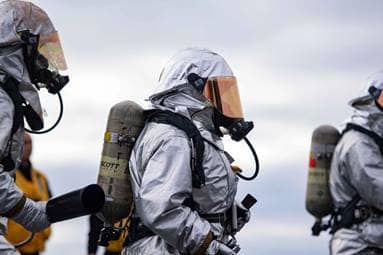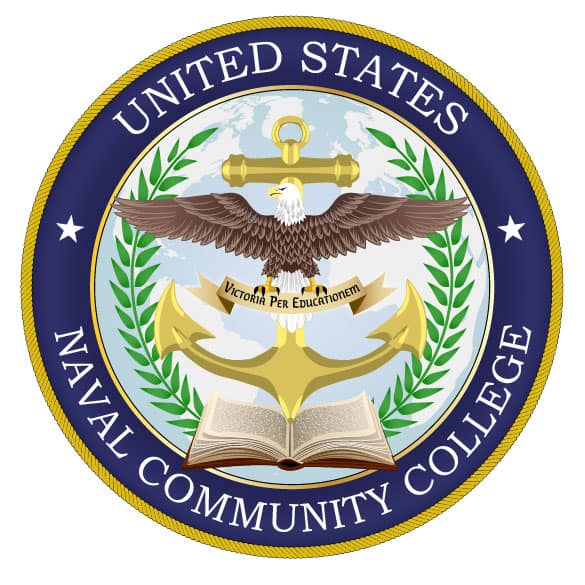In collaboration with the United States Naval Community College (USNCC), Embry‑Riddle Aeronautical University offers an Associate of Science in Emergency Management. This program is designed for active-duty enlisted members of the Navy, Marine Corps, Coast Guard and Coast Guard Reservists. Completion provides a naval-relevant credential that enhances operational readiness and sets students on a path of lifelong learning and success.
Offered entirely online and asynchronously to work with any schedule, the A.S. in Emergency Management gives enlisted Naval professionals the ability to:
- Work with communities to reduce the risk of disasters and manage them when they occur.
- Work with government agencies, non-profit organizations and private companies in planning processes to minimize damage and disruption during emergencies.
- Organize disaster response efforts.
- Support the recovery of communities hit by disaster.
- Plan initiatives for resilient communities.
Our faculty members are industry experts with extensive experience who combine classroom learning with real-world applications of the material. They are excited to share their knowledge and facilitate environments where the next generation of emergency management professionals will grow and thrive.
This degree emphasizes the National Response Framework (NRF) and the Incident Command System (ICS) while instructing students to adopt a whole-community approach to ensure resilience and preparedness for disaster response. Students who complete the program will have the necessary skills for leadership roles in the evolving all-hazards and whole-community context of emergency management, encompassing both military and civil sectors.
Applicants who wish to apply for this program must do so through the USNCC website.
We are very pleased to add the Associate of Science in Emergency Management program to our offerings for the service men and women at the USNCC. This program offers a comprehensive foundation in emergency management and prepares students with the necessary skills for leadership roles in the evolving all-hazards and whole community context of emergency management. We look forward to working with the students who choose to pursue this degree.
Academic Overview, Certifications and Transfer Credit

If students hold existing certification through the National Fire Protection Association or state regulatory agencies or have taken ACE-recommended courses at the National Fire Academy or the FEMA Emergency Management Institute, they may be eligible for transfer credit.
Every associate degree program offered by the United States Naval Community College automatically includes the Naval Studies Certificate, which is made up of five courses on naval history, ethics, force design, civilian-military relations and the geopolitical environment that are integrated into the program of study.
The Associate of Science in Emergency Management is also easily transferable to four-year bachelor’s programs at Embry‑Riddle. Students may continue along the same path and apply for the Bachelor of Science in Emergency Services, Bachelor of Science in Homeland Security, Bachelor of Science in Interdisciplinary Studies or Bachelor of Science in Safety Management or choose a different program of study.
Degree Coursework
| Naval Studies Certificate | ||
| NAV 101 | Naval Ethics and Leadership | 3 Credits |
| NAV 102 | Modern Naval History | 3 Credits |
| NAV 103 | Naval Force Design and Concepts | 3 Credits |
| NAV 104 | Civilian/Military Organization and Policies | 3 Credits |
| NAV 105 | Introduction to the Geopolitics | 3 Credits |
| Emergency Management Leadership Certificate | ||
| HLSD 110 | Introduction to Homeland Security | 3 Credits |
| EMGY 310 | Fundamentals of Emergency Management | 3 Credits |
| HLSD 280 | Professional Skills in Homeland Security | 3 Credits |
| EMGY 430 | Emergency Management and Contingency Planning | 3 Credits |
| HLSD 360 | Strategic Planning and Decision-Making in Homeland Security | 3 Credits |
| Leadership Focus Area — Select One of the Following: | ||
| COMD 365 | Communication for Resilience | 3 Credit |
| EMGY 400 | Introduction to Incident Command System | 3 Credits |
| EMGY 405 | Disaster Policy and Management | 3 Credits |
| ESVS 402 | Fire and Emergency Services Administration | 3 Credits |
| ESVS 405 | Personnel Management for Fire and Emergency Services | 3 Credits |
| HLSD 320 | Homeland Security Law and Policy | 3 Credits |
| Other Requirements | ||
| PHYS 102 | Explorations in Physics | 3 Credits |
|
PHYS 123 or PHYS 142 |
Science of Flight Introduction to Environmental Science |
3 Credits |
| MATH 111 | Pre-Calculus for Aviation | 3 Credits |
| MATH 112 | Applied Calculus for Aviation | 3 Credits |
| CSCI 109 | Introduction to Computers and Applications | 3 Credits |
| ENGL 221 | Technical Report Writing | 3 Credits |
| COMD 219 | Speech | 3 Credits |
|
HLSD 315 or ESVS 301 |
Critical Infrastructure Security, Resilience and Risk Analysis Community Risk Reduction for the Fire and Emergency Services |
3 Credits |
|
HLSD 410 or ESVS 404 |
Exercise Design and Evaluation in Homeland Security Managerial Issues in Hazardous Materials |
3 Credits |
| Total | 60 Credits | |
Career Trajectory

The Associate of Science in Emergency Management prepares students to enter the workforce at employers, including airport management authorities, the American Red Cross, the U.S. Department of Homeland Security, the Federal Emergency Management Agency, or local and state emergency management divisions.
Students who enroll in this program will have access to the Embry-Riddle Center for Career and Professional Development, which offers valuable assistance in career development, such as coaching, resume writing, career expos and more.
Payment/Funding
USNCC pays for up to five courses per year by supporting the costs of tuition, mandatory course fees and required instructional materials (not including computers, calculators or other electronic devices), provided students remain eligible for participation in accordance with USNCC policies.
Frequently Asked Questions
The Associate of Science in Emergency Management is available to students exclusively online and asynchronously from anywhere with internet access.
Active-duty enlisted Navy, Marine Corps, Coast Guard or Coast Guard Reservists who have a high school diploma (or equivalent).
It is based on a flexible curriculum that can work for those with unpredictable schedules and also has immediate real-world applications. The program is also recognized by the National Fire Academy’s Fire and Emergency Services Higher Education (FESHE), which means graduates can earn an NFA certificate when completing most ESVS/FIRE courses. It is also accredited by the Southern Association of Colleges and Schools and the International Fire Service Accreditation Congress.
The A.S. in Emergency Management provides a solid background in administration, planning and disaster management, with a specific focus on leadership techniques.
Having a FESHE-recognized degree prepares you for career advancement in a range of emergency service areas, as well as an initial preparedness for the field. Emergency Management students often secure roles that include:
- Airport Emergency Managers
- Directors of Emergency Management
- Disaster Response Specialists
- Emergency Management Coordinators
- Risk Representatives
Nine-week terms, broken into nine one-week modules with a weekly deadline. There is no live lecture component. All courses are instructor-led, and instructors maintain office hours to best support our students.
- Application: Applications must be completed through the USNCC website.
- Evaluation: The USNCC admissions team will review your application materials and select applicants who are best fit for admission.
- Notification: The USNCC admissions team will send out notifications to applicants who are selected in the enrollment process and/or those who might be put onto the waiting list if demand exceeds the spaces available.
- Command approval: The USNCC admissions team will request approval via electronic form from your command’s Education Service Officer (ESO) or designated command representative (provided on your application).
- Partner institution notification: If approval is granted and your CAC-signed USNCC Student Agreement and Education Records Release forms are submitted by the assigned deadlines, Embry-Riddle's admissions team will review your application materials and determine the status of admission to your desired program.
- Submit college transcripts: If you have previously completed college-level coursework, you will be required to submit official transcripts from all previous institutions where you have attempted or completed college coursework.
- Admission confirmed: If selected for admission into the Associate of Science in Uncrewed and Autonomous Systems, you will be notified of your admission status and the next steps to successfully begin your educational journey. (Applicants not selected for admission may be placed on a waiting list for consideration for future academic terms or recommended for consideration for admission to the Naval Studies Certificate.)

Apply for the Program
Prospective students must apply through the United States Naval Community College website.
When you are ready to apply, please use the application link below.
The only requirements to enroll in this program:
- Participants must be an active-duty enlisted sailor, marine, Coast Guardsman or woman, or Coast Guard Reservist.
- Participants must have a high school diploma or equivalent.
What you will need to provide as you apply:
- The 10-digit number on the back of your CAC card.
- Basic military service information.
- Prior education information.
- Name and contact information for your command’s Education Service Officer, front-line supervisor or designated command representative.
Prospective students will apply through the USNCC website. Under the prompt “Select a Program Plan,” select “ERAU - Emergency Management.” Follow the prompts to complete the application.
If you have any questions pertaining to Embry-Riddle, please email us at wwusncc@erau.edu.
